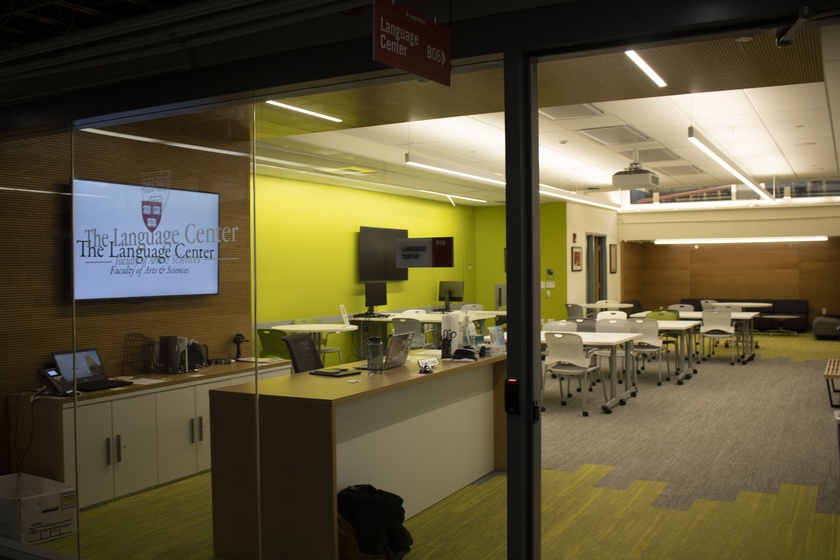{shortcode-bc6db68cfdad7eb3d5841fb8701d67ed299ae6d5}
As a Ph.D. candidate at Harvard studying abroad in Pisa, Mary L. DiSalvo, the language Support Manager and IT Liaison for the Language Center, struggled to find Italian language learning partners. She ended up having to “spam the Ph.D. list” trying to find a language exchange buddy interested in both practicing English with her and helping her improve her Italian. While she did eventually find language exchange partners, it was more difficult than expected and prompted her to consider ways to make the search easier for others.
Upon her return to Harvard, she started the Language Exchange Program within the Language Center to allow Harvard affiliates to find partners more easily than she did. The center pairs Harvard affiliates that speak their partner’s target language, aiming to provide Harvard affiliates with “the possibility of practicing informal conversation with a partner who speaks their target language.” As a recipient of the 2022 Culture Lab Innovation Fund, the exchange has $12,000 of extra funding to expand its reach.
DiSalvo says the Language Exchange program is meant to supplement classroom-based language learning, serving as a “bridge” to introduce students to “new possibilities” outside the classroom.
DiSalvo highlights the program’s wide array of available languages as a strength that differentiates it from other language practice programs on campus: “Where are you going to find a Romanian [language] table?”
She also believes that the program is uniquely set up to accelerate language learning because of its flexibility. Participants are able to coordinate with their language partner to fit with their schedule. DiSalvo tries to streamline the process as much as possible — no feedback forms, no training, no oversight, just the language exchange that participants set up themselves. She says this keeps the program “autonomous” and prevents it from feeling like homework.
A decentralized process like this could be a double-edged sword — while it does reduce stress on the users, it could also lead to limited oversight on the program’s efficacy and user experience. When asked if the program has other forms of oversight, DiSalvo says, “There’s certainly the future possibility of making some things much more guided ... I don’t think we’re there quite yet, although that’s certainly something that could be on the horizon.”
{shortcode-587592248652a178c3e3c749875e408beb867337}
This program seeks to remedy what DiSalvo sees as a broader problem: that students often underestimate the value of learning a new language. She says many undergraduates try to avoid taking language classes by testing out of the requirement; when students “just want to get that degree and get out into the workforce” without taking advantage of Harvard’s language classes, she thinks they are squandering a rare opportunity.
Aside from the intrinsic value of learning a new language, DiSalvo says that even a career-oriented student could benefit from the program: “Employers want people who speak different languages,” she says, flagging Spanish and Chinese as examples of languages that are a “huge boon to your CV.”
Beyond facilitating language learning, DiSalvo also aims for the program to build community. DiSalvo prioritized inclusivity when setting up the language exchange, incorporating undergraduate and graduate school students, as well as faculty, alumni, staff, and retired staff.
A greater user base not only brings together people from different stages of life, but also expands the number of potential matches. There are currently around 800 active users and 367 matches within the program, but DiSalvo wants to expand usership to cover less commonly spoken languages.
“It’s a numbers game,” she says. “We really need to get a broad user base in order to make the program successful.”
However, the program is still limited toHarvard affiliates. “I really want to make it a Harvard-only program,” DiSalvo says. “I think we would lose the cultivation of community that I really want to push with this program.” She says that excluding non-Harvard affiliates does not limit accessibility, since the public is able to use publicly available online alternatives.
DiSalvo plans to dedicate extra funds from the 2022 Culture Lab Innovation Fund to expanding usership: “This is definitely the year to get the word out,” DiSalvo says. She also aims to strengthen its existing community so that the program is “not just a DIY virtual experience.” She plans on introducing meetups for current participants.
For busy Harvard students, finding the time to learn a language can be particularly challenging, especially in an environment where studying languages instead of taking other classes can feel risky for career prospects. But perhaps, as the program expands, Harvard students will increasingly find time to incorporate low-commitment language learning into their everyday lives.


